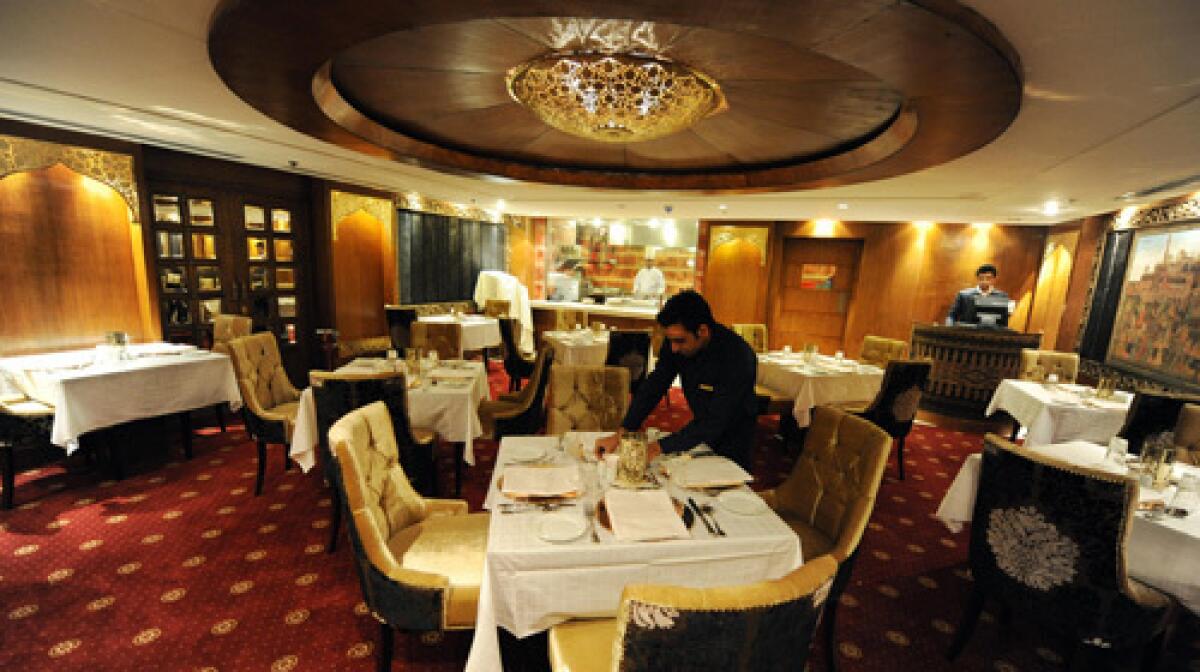In Pakistan, fighting terrorists the five-star way

I’m living on the edge and doing my bit to make sure the terrorists don’t win -- from the cloud-like, pillow-swamped bed of a luxury hotel.
As a correspondent, I’ve stayed in some shaky places over the years, from camping beneath Iraqi underpasses during the U.S.-led invasion to tenting it in an abandoned nunnery in East Timor amid civil war. So my hardship post rattling around in the five-star Marriott Hotel in Islamabad recently is about as good as it gets for danger duty.
Room service, please. Oh stop, not another mint on my pillow.
It’s all a cakewalk, as long as you don’t stop and think where you are: the site of a horrific attack in September that killed more than 50 people in the Pakistani capital. Somewhat understandably, the images beamed around the world of an explosives-packed truck ramming the security gate have damped customer enthusiasm.
The 24-foot-deep, 59-foot-wide crater has been filled in, replaced by a massively reinforced 12-foot-high wall and a pyramid berm structure of the sort used in war zones.
There are also dogs, dozens of police officers and guards with machine guns, high-intensity lighting that makes you look like you’re at a Dodgers night game, sophisticated vehicle barriers and state-of-the-art X-ray machines. And a sniper sitting on the parapet.
Inside, though, it’s another planet. Sonatas waft from a lonely piano player. A house band croons over in the dining area, its plaintive tones bouncing tinkle-tinkle off the opulent chandeliers. The silver glistens, the marble shines.
At one point as I sit for a meal, I count 17 employees all ready to serve yours truly, the only customer in sight.
Most of the workers lost friends and suffered near misses. Now they’re not only worried about their security but their jobs. They try incredibly hard to be cheerful and make you feel welcome and mean nothing but the best. But every time I cross the lobby, I feel like something of a pied piper being followed by a small posse chirping, bobbing and Uriah Heeping as I head for the elevator. Can I help you navigate? Everything absolutely, totally, completely all right with your stay? Are you sure?
Why am I here? In part I suppose I’m slightly less risk-averse than some others, which may have drawn me to this profession. And I believe it’s important to support the hotel and its staff. I also believe lightning tends not to strike twice. At least while I’m here, I hope.
And did I mention the rates are extremely reasonable -- a third the price of other hotels in town? As a sweetener, they’ve thrown in an endless mini-bar. We’re in the Islamic Republic of Pakistan, so there’s no alcohol. But every time I have a chocolate bar, some juice, a cookie, a replacement magically appears. The tooth fairy does exist.
One of the nights I’m there, the hotel hosts a big wedding, returning some of the bustle to the place. Mostly it’s pretty deserted. I chat with a few fellow guests. There’s a German married to a French diplomat here on assignment who seems to spend most of his time lifting weights.
An Australian of Pakistani descent has come to Islamabad to visit relatives. “I’m very worried, very nervous,” she says. “But I’ve been staying at the Marriott for 20 years and felt it was important to stay here.” And a retired Spanish hunter with two satellite phones has just returned from killing some beasts near the insurgent-filled Swat Valley. He doesn’t seem afraid of anything, let alone a high-profile luxury hotel.
I stop in for a chat with Zulfiqar Ahmed, the hotel’s hospitable general manager, who offers me tea. The hotel was targeted, he said, because it’s been a symbol of globalization, international trade and modernity in Islamabad.
Ahmed had just started in the job when the attack hit, and his first day was consumed with arranging funerals, helping the families of dead and injured employees, making sure there was counseling for the traumatized.
Throughout the hotel’s accelerated rebuilding process -- it was accommodating guests three months later -- he received a string of personal threats. These came, he believes, from militants with an interest in seeing the hotel fail.
“Having destroyed us,” he said, “it wasn’t acceptable to allow us to rebuild.”
The hotel’s soft launch and discount rates have been extended through April and occupancy is slowly improving, he said. But he knows that the hotel’s, and the nation’s, recovery will take time.
“A place like Egypt is very nice with its pyramids and museums, but God blessed Pakistan with such incredible beauty,” he said. “Until they improve the law and order in this country, however, it’s foolish to think people will come and visit in large numbers.”
So this is what it feels like to stay in a symbol of globalization, I reflect, as I amble back to my room, double-check the restocked mini-bar and gaze out the window at the elaborate security barriers outside my five-star bubble.
More to Read
Start your day right
Sign up for Essential California for news, features and recommendations from the L.A. Times and beyond in your inbox six days a week.
You may occasionally receive promotional content from the Los Angeles Times.






